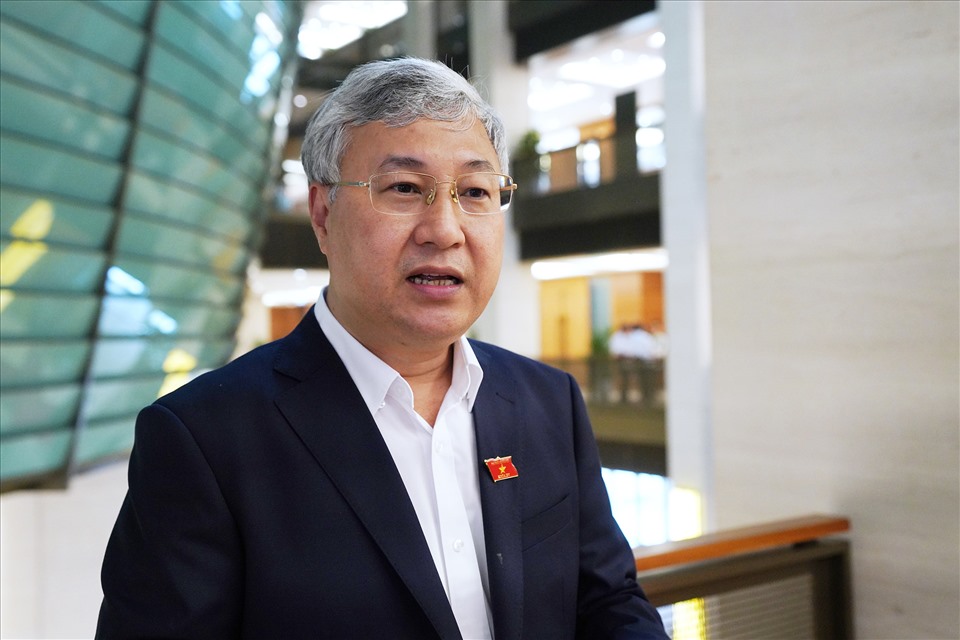If the electricity is priced too low, national resources shall be sold at low prices inadvertently
At the Government's regular press conference, Mr. Do Thang Hai, Deputy Minister of Industry and Trade said that Vietnam Electricity (EVN) had proposed increasing electricity prices with specific options.
The Government has requested the Ministry of Industry and Trade and other ministries to study EVN’s proposed plan. Accordingly, the Ministry will develop a roadmap for electricity tariff increase, taking into account the inflation factors and people's lives.
EVN's proposal to increase the electricity tariff is mainly derived from soaring input costs for electricity production, which has caused the Group to record a loss of more than VND 31 trillion in 2022.
Talking to Labor newspaper, National Assembly delegate Tran Van Lam - Member of the Finance - Budget Committee of the National Assembly said that electricity price is a very important factor in socio-economic development because it is an input material of all economic sectors as well as people's lives.
Recently, although the world economic and political situation has experienced many complicated changes and soaring inflations have been seen in many countries, Vietnam has kept inflation and CPI in control, so our electricity prices maintain stable - meanwhile, input factors of electricity prices have been climbing.

National Assembly member Tran Van Lam. Photo: Van Phong
In Vietnam, the average price of imported coal supplied to power plants in 10 months in 2022 has increased by more than 150% compared to the same period in 2021. The price of mixed coal (locally produced coal mixed with imported coal) supplied to thermal power plants in the third quarter of 2022 of Vinacomin and East North Corporation has also risen by more than 50% compared to the beginning of the year.
"Electricity is a special commodity which is priced by the Government. The consideration and pricing of electricity must be based on the overall relationship of the macro-economy, especially the inflation factor must be taken into account. How should the impacts of electricity price adjustment be analyzed in other areas?
If other macro factors (affecting inflation) go up at a reasonable level, electricity prices should be allowed to increase, so that Vietnam's electricity price is close to the market price of the world and the region”, Lam said.
According to the National Assembly member, electricity is basically produced from national resources, if it is priced too low, inadvertently we are selling national resources cheaply, causing waste and damage to the nation.
However, not because of the fact that electricity prices can climb too high, affecting people, affecting inflation.
"I think that it is the right time to consider increasing electricity prices, as well as reforming the current electricity tariff schedule with a lot of defects. At the same time, the change in power generation mix with increasing penetration of renewable energy sources (high price) should be taken into account”, he said.
Electricity price increase should be calculated at an appropriate level
According to Prof. Tran Dinh Long - Vice Chairman of Vietnam Electricity Association, electricity price is composed of 4 components: electricity generation cost, transmission charge, distribution charge and ancillary service fee. Of these four components, the cost of electricity generation, or in other words power sources, accounts for about 65% in Vietnam's context. In the future, electricity generation costs will be increasing, the advantage of low generation cost from Vietnam's hydroelectricity hence will be decreasing.
"Currently, open-pit coal has been fully exploited, therefore underground coal mining, deep underground coal, has been being exploited, leading to higher coal prices. Moreover, the price of imported coal depends on exchange rates, not to mention fluctuations in the world energy market.
Therefore, increasing electricity prices must be based on calculations of price fluctuations of these resources, plus foreign exchange rates. If prices of raw materials increase, labor prices increase, exchange rates increase too, it is necessary to increase electricity prices at an appropriate level," he said.
For nearly 4 years, electricity prices have not been adjusted
At Decision 24 on the mechanism for adjusting electricity prices in the year, quarterly EVN updates electricity generation costs of the preceding quarter, estimates input cost parameters of power generation of remaining quarters of the year, etc. to calculate the average retail electricity tariff. If input parameters of power generation cause the average retail tariff to increase by 3% or more, the electricity prices will be adjusted to increase and vice versa.
"Thus, a mechanism is made available to ensure that electricity prices go along with input prices, reflecting price fluctuations in the market on the average retail tariff," Mr. Hai said.
According to Decision 24, the minimum time for adjusting the average electricity tariff is at least 6 months from the most recent adjustment. This is to objectively reflect generation cost fluctuations. Most recently, the average retail tariff was adjusted on March 20, 2019, which means that it has not been adjusted for almost 4 years.
evn.com.vn
Share